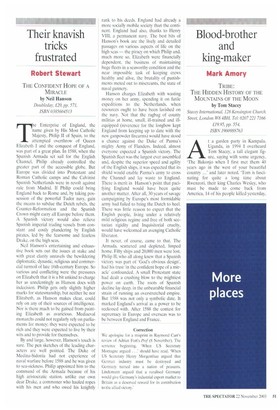Their knavish tricks frustrated
Robert Stewart
THE CONFIDENT HOPE OF A MIRACLE by Neil Hanson Doubleday, £20, pp. 571, ISBN 0385604513 Tie Enterprise of England, the name given by His Most Catholic Majesty, Philip II of Spain, to the attempted overthrow of Queen Elizabeth I and the conquest of England, was part of a great plan. In 1588, when the Spanish Armada set sail for the English Channel, Philip already controlled the greater part of the accessible globe. But Europe was divided into Protestant and Roman Catholic camps and the Calvinist Spanish Netherlands were in revolt against rule from Madrid. If Philip could bring England back to Rome and, by taking possession of the powerful Tudor navy, gain the means to subdue the Dutch rebels, the Counter-Reformation and the Spanish Crown might carry all Europe before them. A Spanish victory would also relieve Spanish imperial trading vessels from constant and costly plundering by English pirates, led by the fearsome and fearless Drake, on the high seas.
Neil Hanson's entertaining and exhaustive hook sets out the issues at stake and with great clarity unravels the bewildering diplomatic, dynastic, religious and commercial turmoil of late 16th-century Europe. So various and conflicting were the pressures on Elizabeth that it is a bit unkind to charge her as unrelentingly as Hanson does with indecision. Philip gets only slightly higher marks for statesmanship, but neither he nor Elizabeth, as Hanson makes clear, could rely on any of their sources of intelligence. Nor is there much to be gained from painting Elizabeth as avaricious, Mediaeval monarchs could not regularly rely on parliaments for money; they were expected to be rich and they were expected to live by their wits and to provide for themselves.
By and large, however, Hanson's touch is sure, The pen sketches of the leading characters are well pointed. The Duke of Medina-Sidonia had not experience of naval warfare before 1588 and he was given to sea-sickness. Philip appointed him to the command of the Armada because of his high aristocratic station, unlike our own dear Drake, a commoner who hauled ropes with his men and who owed his knightly rank to his deeds. England had already a more socially mobile society than the continent. England had also, thanks to Henry VIII, a permanent navy. The best bits of Hanson's book are the lively and detailed passages on various aspects of life on the high seas — the piracy on which Philip and, much more so, Elizabeth were financially dependent, the business of maintaining huge fleets in a seaworthy condition and the near impossible task of keeping crews healthy and alive, the brutality of punishments meted out to miscreants, the state of naval gunnery.
Hanson charges Elizabeth with wasting money on her army, spending it on futile expeditions to the Netherlands, when resources ought to have been lavished on the navy. Not that the ragbag of county militias at home, small, ill-trained and illequipped (reverence for the longbow kept England from keeping up to date with the new gunpowder firearms) would have stood a chance against the Duke of Parma's mighty Army of Flanders. Indeed, almost everyone expected a Spanish victory. The Spanish fleet was the largest ever assembled and, despite the superior speed and agility of the English ships, it was expected that its shield would enable Parma's army to cross the Channel and lay waste to England. There is merit in Hanson's point that pacifying England would have been quite another matter. After all, 30 years of savage campaigning by Europe's most formidable army had failed to bring the Dutch to heel. There was little reason to expect that the English people, living under a relatively mild religious regime and free of both sectarian rigidity and Inquisitorial cruelty, would have welcomed an avenging Catholic liberator.
It never, of course, came to that. The Armada, scattered and depleted, limped home. Fifty ships and 20,000 men were lost. Philip II, who all along knew that a Spanish victory was part of 'God's obvious design', had his trust 'in the confident hope of a miracle' confounded. A small Protestant state had dealt a crushing blow to the mightiest power on earth. The roots of Spanish decline lay deep, in the unbearable financial strain of running an overstretched empire. But 1588 was not only a symbolic date. It marked England's arrival as a power to be reckoned with. After 1588 the contest for supremacy in Europe and overseas was to be between England and France.
Correction
We apologise for a misprint in Raymond Carr's review of Adrian Fort's Prof (8 November). The sentence beginning, 'When US Secretary Montague argued . . .' should have read, 'When US Secretary Henry Morgenthau argued that German industry must be destroyed and Germany turned into a nation of peasants, Lindemann argued that a ruralised Germany would give Germany's industrial export market to Britain as a deserved reward for its contribution to the allied victory.'


























































































 Previous page
Previous page